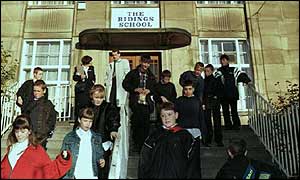 I hear the Ridings school is back in trouble!
I hear the Ridings school is back in trouble! Interesting that because, in reality, it never was out of trouble.
Some of you may wonder what I am talking about. Way back in the dim and distant past, when I was a cub reporter on the Halifax Courier, I broke a story about chaos at the Ridings School in West Yorkshire which became big national news. Basically, the kids were rioting and the academic results were absolutely abysmal (only 8 per cent of children got 5 A to C grades). The national newspapers followed up my story and had a field day, labelling it the "School from Hell", "The Worst School in Britain", and "Grange Hell".
The Ridings was closed down, its leaders were chucked out and it was reopened under a new and charismatic joint headship. The story ran for months and became the focus for a national debate about failing school leadership. This approach, that schools were bad because their leaders were bad and that schools could be saved by new leadership, has defined the Labour Government's basic approach to education policy since. Tony Blair is particularly attached to it. I once heard him say he could tell how good a school was without even entering it, but simply from his first impressions of the head teacher. What a load of toss!
Anyway, the media have periodically revisited the Ridings in the decade since it became infamous and have told a heart warming story of a struggle against the odds, in which charismatic leaders have dragged a down-and-out school from the depths to something approaching respectability. Millions of pounds have been poured into this flagship project. The two headteachers who took the helm after the Ridings disgrace, Peter Clarke CBE and Anna White CBE, have been hailed as heroes and showered with plaudits and honours for "turning the school around". Successive education secretaries and Blair himself have made numerous visits to the school to trumpet this example of how the worst can be made, if not into the best, then into the just below average.
So how shocking to read that headline on the BBC website this week: "Ridings School 'inadequate' again"! The article continued breathlessly:
The Ridings School in Halifax has been given notice to improve after Ofsted inspectors said it was "performing less well than could be expected". The report said pupils were disruptive and capable of achieving more, and that teaching quality was "variable".But it praised the new head teacher and leadership team, saying they had made good plans to raise standards.
Well, as the person who broke this story, I must say I'm not surprised at all that the Ridings school is inadequate "again". The plain fact is that it always has been inadequate and always will be. All this talk about great leadership, while no doubt true, has completely missed the point.
That terrible 8 per cent of students getting 5 GCSE A-Cs became 6 per cent in the year after the "rescue" of the school, then 3 per cent. Fair enough, you might say. This might be put down to the inadequacies of the old regime playing themselves out. But never, between 1996 and 2003 did the number of good GCSEs top 13 per cent. Then, in 2003, a great set of results: 25 per cent good grades! Still absolutely appalling by national standards, but an improvement. Head teacher Anna White said this marked the "long-awaited turning point". To mix metaphors, the turning point seems to have been a false dawn. Last summer, the figure was back down to 14 per cent. The Ridings never was "the worst school in Britain". However, despite the nice fairytale the Government and parts of the media have told in the decade since it was "rescued", it always has been a poorly performing school.
Why? The real issue was and is that the structure of education in Halifax inevitably means that the Ridings will always be in the Doldrums. A vicious selective education system exists in the town. It is a small place with two grammar schools in it and a hierarchy of schools beneath them, which exist to cater for the various grades of "failures" who didn't get into the flagship schools. We are not just talking a "Grammar School" and "Secondary Modern" system here; we are talking "Grammar School" and then "Secondary Modern, level 1", "Secondary Modern, level 2", "Secondary Modern, level 3" ... etc. etc... and then "The Ridings" at the very bottom of the pile. That is a bit of a caricature, there is a bit of localism in the system, but I think it catches the flavour of what is going on. The Halifax situation is particularly vicious because the size of the town means anybody can try to attend any school, but the elitism is the same as with any selective system. The grammar schools raison d'etre is to reproduce success. They take the best children, mix them together in an elite environment, and their results are excellent. The Ridings, at the very bottom of the hierarchy, is arguably set up to fail, to safely accommodate "failing children" for five years well away from the children who have some hope of success. Of course there are children in this group who have tons of potential but any success they do achieve is really remarkable in the Ridings context. The Ridings takes these worst performing children at 11-years-old, mixes them together with no sight of any students who were in any way successful at that age, and its results are terrible. Surprise! Surprise!
If people want to do something about the quality of education offered to the children of Halifax, they should quit looking at the leadership of the Ridings and start looking at the grammar school just 300 metres down the road from it and the other one about a mile away. They should ask themselves whether, in a small town with such a hierarchical structure of education, we can ever expect the school(s) at the bottom of that hierarchy to be any good? The stuck record that is the Ridings story suggests not.
The problem is that looking at such structural issues requires good leadership at the highest level, ie. national politicians. In truth, the leadership at that level on this issue has always been "inadequate". They have, quite consciously, avoided making any decision on an issue that would be politically problematic. Like any bad head, they have avoided the difficult call and preferred to blame their underlings for poor performance.


























